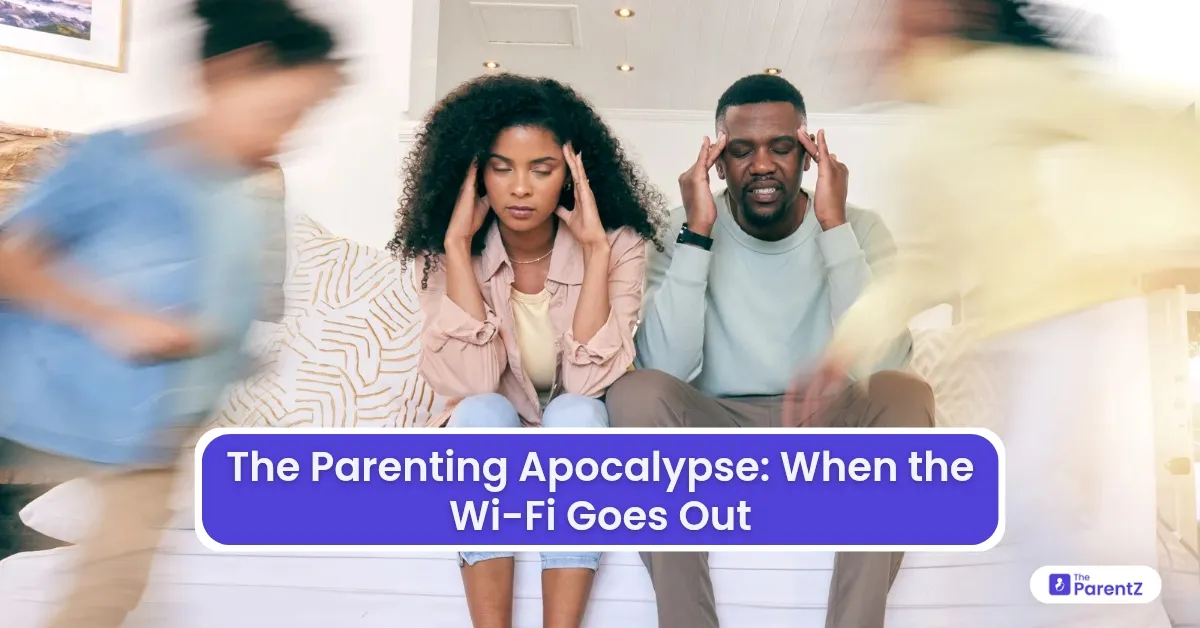The silence hits first. That eerie quiet when the YouTube video stops mid-sentence, when the tablet screen freezes on a pixelated Minecraft block, when the gaming controller suddenly becomes just an expensive piece of plastic. Then comes the sound every parent dreads: "Mom! Dad! The internet isn't working!"
And just like that, your house transforms into a disaster zone. Kids emerge from their rooms like confused zombies, blinking in the unfamiliar light of reality. The eight-year-old starts pacing like a caged animal. The teenagers dramatically throw themselves onto the couch with the kind of despair usually reserved for Shakespeare's tragedies. Even the toddler senses something is wrong and begins that low-level whining that means trouble is brewing.
Welcome to the modern parenting apocalypse.
The Chaos Unleashed
Within minutes, the house erupts. There's bargaining ("Maybe if we unplug the router and plug it back in?"), denial ("It's probably just slow, let me try again"), and eventually, pure chaos. Kids who haven't spoken to each other in weeks are suddenly fighting over board games they forgot they owned. The phrase "I'm bored" gets repeated so many times it starts to sound like a broken record.
But here's the thing - this chaos isn't really about the internet. It's about routine being shattered. Modern families have built their entire rhythm around screens. Breakfast happens with cartoons. Car rides are peaceful because of tablets. Evening wind-down involves Netflix. When that digital backbone disappears, everything falls apart.
Was It Always This Way?
You might think previous generations had it easier, that kids back then were naturally more creative and independent. But that's not entirely true. Every generation has had its crutches. In the 1950s, parents panicked when the radio programs went off-air. The 1980s brought anxiety when the VCR ate the one movie tape that kept the kids quiet. The difference is scale and dependency.
Today's kids have grown up with instant everything. Bored? There's an app for that. Want to learn something? YouTube has a video. Need entertainment? Netflix has thousands of options. When that suddenly disappears, it's not just inconvenient - it's genuinely disorienting.
The Adult Meltdown
Let's be honest, though; it's not just the kids who panic when the Wi-Fi dies. Adults do, too. That moment when you reach for your phone to check something and remember the internet is down? The slight anxiety when you can't mindlessly scroll through social media? The way you keep refreshing your email even though you know it won't work?
We've all become dependent on that constant digital connection. We use our phones to settle arguments, to look up recipes, to check the weather, to fill those awkward quiet moments. When it's gone, we're left face-to-face with actual silence, actual boredom, actual human interaction without a screen as a buffer.
The truth is that parents get just as restless as their kids. We've forgotten how to sit with our thoughts. We've lost the art of being bored without immediately reaching for a device to fix it.
The Hidden Gift
But here's what happens after the initial chaos settles: magic. Real, old-fashioned, no-batteries-required magic.
Kids rediscover toys buried in closets. Families end up talking to each other - actually talking, not just coordinating schedules. Someone suggests a walk, and everyone groans, but then they actually go, and it's kind of nice. Board games get dusted off. Stories get told. Kids draw pictures that aren't screenshots from their favorite games.
The house gets quieter, but it's a different kind of quiet. Not the zombie-like silence of everyone staring at screens, but the comfortable hum of people actually doing things together.
Maybe We Need This More Often
What if we didn't wait for technical difficulties to force these moments? What if we chose them?
This isn't about becoming anti-technology parents who throw tablets in the trash and lecture about the good old days. Technology isn't evil - it's a tool, and like any tool, it works best when we use it intentionally rather than letting it use us.
Maybe the Wi-Fi going out is actually a gift wrapped in frustration—a reminder that boredom isn't an emergency that needs to be immediately fixed, that kids are capable of entertaining themselves when given the chance, and that families can function—and even thrive—without constant digital input.
Conclusion
The next time the internet goes down, try to resist the urge to immediately call the service provider. Let the chaos happen. Let everyone be bored for a while. See what emerges from the silence.
You might be surprised by what you find when the screens stop working, and real life has room to breathe again.





Be the first one to comment on this story.